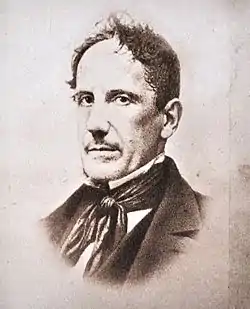The Sovrans of the Old World
"The Sovrans of the Old World" (Romanesco original title: Li soprani der monno vecchio) is an 1831 sonnet written in the dialect of Rome, by poet Giuseppe Gioachino Belli. It is part of the collection Sonetti romaneschi, sometimes listed as number 361[2][3][4] or 362.[5][6][7]
C’era una vorta un Re cche ddar palazzo / mannò ffora a li popoli st’editto: / Io sò io, e vvoi nun zete un cazzo (eng.: Once there was a king who from his palace Sent out among the people this edict: "I am I, and you're nothing but shit."[1])

Content
The sonnet is primarily a satire of 1800s Italian civilization. However, in analyzing the raw, crude politics of his own time Belli touched upon a much broader section of Italy’s history, and of the losses the nation suffered from foreign invasions and local abuses of power.
The parable quoted above describes the latter phenomenon. A king confiscates all of his vassals’ possessions; when the people ask why, the king replies that he can treat them as he likes because he matters and they do not. Although phrased in vulgar terms, this remark encompasses a living reality. Thus Belli from this brief anecdote part to analyze the particular condition of the populace and mediocre Italian which, because of its same condition of choice, is always found to suffer and to keep the head bent in front of who is more powerful. As it says in the sonnet the author, who is not a Pope, King or Emperor in our society, and that counts for nothing less than the earth we walk. And so, returning to speak feudal monarch, warns the people who dared to question his statutes and cruelty that was out of the mouth, it would have been put to death, because perhaps the Executioner was the only honest work to do, if you had not powerful, says the king. And the people, stupid, inferior, stupid and gullible, cheering applauding the king's words.
Among the translators of the sonnet, Peter Nicholas Dale, which translated it into Strine, the Australian English dialect of the 1960s, in which title is rendered as The Lieders a the Old World.[8]
The verse Io sò io, e vvoi nun zete un cazzo (literally "I am I, and you are fuck all") was famously appropriated by Mario Monicelli in his 1981 movie Il Marchese del Grillo, in which it is rendered in modern Romanesco dialect as "io sò io e voi nun siete un cazzo,"[9] and has since then become a frequent quote of contemporary Italian culture.[10]
Notes
- Translation from Norse (1956)
- Coarelli (2000) pp.14-5 quote:
La «turba» che forma il coro plaudente alle banali sciocchezze pronunciate dal papa rappresenta, piuttosto che una generica opinione pubblica, la cultura ufficiale dei «cento archidetti e antiquari della corte» presenti alla scena, la legione degli «intellettuali» cortigiani proni all'adulazione e al servilismo (ieri come oggi), immortalati forse anche nel sonetto 361 (Li soprani der monno vecchio) dove, l'affermazione perentoria del re «Io so io, e voi nun zete un cazzo», trova l'immediato consenso dei sudditi «è vero, è vero»
- Giordani (1975) quote:
Dei tre sonetti favolistici (Li soprani der monno vecchio, 361; Uelezzione nova, 1393; La favola der lupo, 1567) leggeremo il primo, che è direttamente ispirato alla reazione europea dopo il '31.
- Muscetta (2002) p.151
- Vighi (1992) p.290
- Teodonio (1991) p.141
- Malato (1998) p.1015
- Monicelli (2009) quote:
Monicelli: "Ricorda la battuta travolgente del Marchese del Grillo: -…io so’ io e voi nun siete un cazzo-"? Interviewer: Certo. Monicelli: "Quello è un sonetto del Belli. Se scrivi qualcosa su Roma il Belli non lo puoi non conoscere"
. - Berselli (2010) quote:
Intanto Berlusconi prosegue nella sua partita ideologica. Ha plasmato la società italiana facendole capire che leggi e regole non sono niente (proprio come il marchese del Grillo, “io so’ io e voi nun siete un cazzo”).
References
- Berselli, Edmondo (2000) Senza più regole in l'Espresso, March 11, 2010
- Coarelli, Filippo and Giuseppe Gioachino Belli (2000) Belli e l'antico: con 50 sonetti di G. G. Belli
- Norse, Harold (1956) Translations from G. G. Belli in The Hudson Review Vol. 9, No. 1 (Spring, 1956), pp. 71–85
- Mario Monicelli (2009), Interview to Mario Monicelli in Corriere magazine, September 2, 2009,
Further reading
- Norse, Harold (1960) The Roman Sonnets of Giuseppe Gioachino Belli. Preface by William Carlos Williams. Introduction by Alberto Moravia
